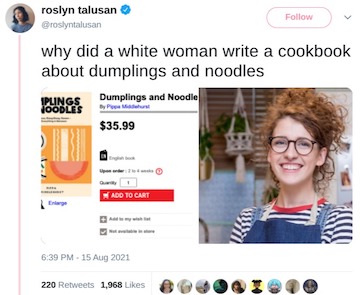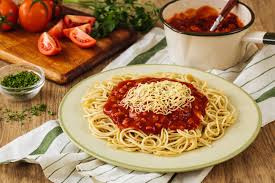The recent cultural appropriation controversy over Pippa Middlehurst’s new cookbook exploring noodles and dumplings has some instructive elements for the wine industry. One of those lessons is that there is little if any chance of the charge of cultural appropriation being visited upon a person producing wine or writing about wine. But there are other lessons too.
First the background. Middlehurst, 31, won England’s first “Best Home Chef” contest in 2018. She has been a food blogger for some time. Middlehurst has a degree in microbiology and molecular biology and is an assistant cancer researcher in England. She claims to have had an interest in Asian cuisine since she was a child and in 2019 traveled to China to study the cuisine of that culture. This resulted in her latest book, “Dumplings and Noodles: Bao, Gyoza, Biang Biang, Ramen – and Everything In Between”.
Controversy broke out on August 15 when Roslyn Talusan, a Philipino-Canadian journalist tweeted a picture of Middlehurst and her book and asked, “Why did a white woman write a cookbook about dumplings and noodles?”
Talusan followed up that tweet with this one:
“Anyway, Pippa Middlehurst is neither the first or the last unoriginal white person to profit or build a career on a culture they do not belong to.”
build a career on a culture they do not belong to.”
The tweets spread across the Internet with Middlehurst getting raked over the coals with charges of racism and cultural appropriation and Talusan being lambasted for the suggestion of this being an example of cultural appropriation and for scolding Middlehurts. Talusan eventually asked for Paypal donations so she could pay for the therapy she said she needed as a result of what she said were all the “nazis” attacking her and then she simply locked down her twitter account. MIddlehurst followed and locked down her account.
Talusan’s was a particular kind of cultural appropriation charge. We’ve seen them before: a white person cooking for profit the cuisine of an ethnic group to which they did not belong. We saw this charge leveled in the Portland Burrito Case and Gordon Ramsey’s Lucky Cat Episode.
These kinds of charges will not come for winemakers or wine writers. The reason, of course, is due to the fact that wine is predominantly a European tradition. Certainly wine’s history, development and refinement is primarily a European/Western Civilization phenomenon that over time has spread across the globe and has become a pursuit by individuals of all ethnic and racial backgrounds. There is no avenue for cultural appropriation charges to be leveled against white winemakers in the same way Tulasan leveled them against Middlehurst.
Nor is there any opportunity for non-whites to be charged with cultural appropriation for making wine or writing about wine. Cultural appropriation only occurs, it is said, when a dominant culture or people profit off items associated with a non-dominant culture. The profiteering is the key part in this definition of “cultural appropriation”. There have been no credible charges of cultural appropriation leveled against any white folks for simply cooking foods associated with other cultures.
Wine is not the only food-related item that is immune from cultural appropriation charges due to its intimate connection with the West. Pasta, pizza, burgers, cider, beer, barbecue, and numerous others have intimate connections with the West, but wine is perhaps the best example.
its intimate connection with the West. Pasta, pizza, burgers, cider, beer, barbecue, and numerous others have intimate connections with the West, but wine is perhaps the best example.
The fact that both Talusan and Middlehurst were both raked over the Internet coals during this controversy suggests the concept of cultural appropriation, at least as it relates to food, is controversial and not universally held by any means.
If I’m being honest I have to admit I find the concept of cultural appropriation troubling for its underlying principle that the punishment for the sins of the father ought to be visited upon the son. The concept is not that white people, or any people, ought not to engage with foods from cultures other than theirs. It is that white people alone ought not to profit from their engagement with foods from another culture. It is a form of punishment and an attempt to enforce unofficial reparations.
Middlehurst’s sin was not that she did not take seriously Asian food nor celebrate its cultural source. She has done both. Her sin was that she was a member of a people that have in the past oppressed others and not that she has done the oppressing. This is an important distinction in my mind.
When the argument is applied to the publishing industry, claiming that white writers are favored over writings of non-white writers who belong to the culture from which the food is traditionally associated, the same issue of punishment for the father’s sins being applied to the son arises.
But as to wine, it is its origins in Western Civilization that protects it from being the subject of cultural appropriation charges. This is not to say there is no effort to “deWesternize” wine. This effort is primarily formed in the attempt to deemphasize the traditional language of wine (particularly its descriptors) that largely originate in the French and English languages and focus on flavors and aromas associated with the West. Additionally, you sometimes see wine associated with “colonizer” charges for the way it has been introduced into non-European places such as Australia, New Zealand, North Africa, and South America.
It is somewhat ironic that as North America and Europe continue to diversify and as mixed-race unions proliferate, non-traditional aroma, flavor and textural descriptions of wine will slowly and naturally enter the lexicon without any need for the finger-wagging of scolds or charges of racism and colonizing. This is a good thing.
It is also a good thing that wine will likely remain immune from cultural appropriation controversies. The longer it stays in this increasingly rarified space the more likely it will continue to bring pleasure to all people.


Be the first to comment